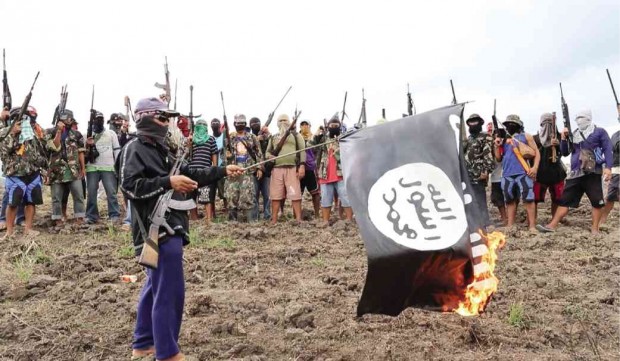
Members of an erstwhile unknown group calling itself “Red God Soldiers” burn a replica of an Isis flag on the day they announced their existence somewhere in Central Mindanao. JEOFFREY MAITEM/INQUIRER MINDANAO
WASHINGTON, United States — An Islamic State of Iraq and Syria (ISIS) operative captured by US special forces in Iraq last week is a chemical weapons expert for the extremist group, two US military officials said Wednesday.
The operative’s capture was confirmed last week by an American official, who said the interrogation had yielded “good things.”
READ: British counter-terror official warns of ISIS attack | No Isis threat but military ready for worst-case scenario–AFP
The ISIS leader was captured by special forces that the Pentagon recently deployed to conduct raids against the Islamic State group. He is currently detained in Iraq, one of the officials said.
According to CNN, the US military has conducted airstrikes against “targets it believes are crucial to ISIS’ chemical weapons program.”
NBC identified the prisoner as Sleiman Daoud al-Afari, an expert in chemical and biological weapons who formerly worked for Saddam Hussein’s regime.
On Wednesday, Pentagon spokesman Jeff Davis declined to confirm that US forces had captured an ISIS chemical weapons expert.
But he added, “We know that ISIL has used chemical weapons on multiple occasions in Iraq and Syria.”
In February, Director of National Intelligence James Clapper and CIA Director John Brennan for the first time openly accused the ISIS of using chemical weapons, including mustard gas, in Iraq and Syria.
Sources close to the Organisation for the Prohibition of Chemical Weapons confirmed last month that mustard gas was used in fighting in August in northern Iraq, without specifically blaming ISIS for the attack.
The group also confirmed mustard gas was used on August 21 in Marea in Syria, again without naming the perpetrator of the attack.
Mustard gas — also known as “sulfur mustard” — can cause respiratory distress, momentary blindness and painful blisters.
It was first used by Germany in Belgium in 1917 and was banned by the UN in 1993.